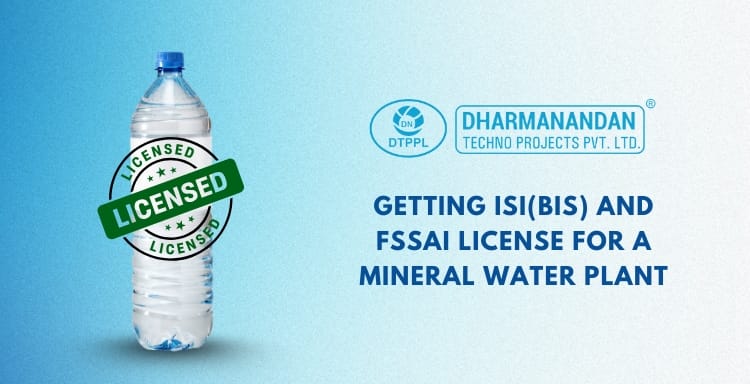
Table of Contents
How to Get ISI (BIS) and FSSAI License for a Mineral Water Plant?
October 20, 2024
Starting a mineral water plant in India involves more than just acquiring the right equipment and setting up production. One of the most critical steps is obtaining the proper certifications and licenses that ensure your water meets quality and safety standards. In this guide, we’ll break down the process of acquiring two crucial certifications: the ISI (Bureau of Indian Standards) license and the FSSAI (Food Safety and Standards Authority of India) license.
These certifications are mandatory for any business looking to operate a mineral water plant, as they ensure that the water being produced meets both safety and regulatory standards.
Understanding the ISI (BIS) Certification
The ISI certification, provided by the Bureau of Indian Standards (BIS), is a mark of quality and assurance for products manufactured in India, including packaged drinking water. It helps ensure that the water meets the necessary safety standards before it is made available to consumers.
Legal, Regulatory, and Licensing Requirements for Mineral Water Plants
Operating a mineral water plant in India requires compliance with several mandatory licenses, environmental approvals, and registrations. These ensure product quality, public safety, and legal operation.
1. Mandatory Licenses
- FSSAI License:
All food and beverage businesses, including mineral water plants, must obtain a license from the Food Safety and Standards Authority of India (FSSAI). It guarantees compliance with hygiene and safety standards under the Food Safety and Standards Act, 2006. The type of license (Basic, State, or Central) depends on annual turnover. Packaged water is considered a “high-risk” category, so Basic registration is usually insufficient. - BIS (ISI) License:
The Bureau of Indian Standards (BIS) mandates quality standards for packaged drinking water. Key standards:- IS:14543 for packaged drinking water
- IS:13428 for packaged natural mineral water
Plants must pass rigorous inspections and lab tests to receive the ISI mark, which certifies safety and quality.
- Trade License:
Issued by the local municipal corporation, this license legally authorizes the plant to operate in its jurisdiction.
2. Environmental Approvals and Compliance
- Central Ground Water Authority (CGWA) NOC:
Required for legal extraction of groundwater for commercial bottling. - State Pollution Control Board (SPCB) Consent:
Includes Consent to Establish and Consent to Operate, ensuring proper waste management and emission control. - Plastic Waste Management Authorization:
Bottled water production involves plastic bottles, so plants must comply with Extended Producer Responsibility (EPR) regulations issued by the Central Pollution Control Board.
3. Other Essential Registrations
- Business Registration: Legal entity registration (proprietorship, partnership, LLP, private limited), along with PAN and GST registration.
- SSI / MSME Registration: Optional registration for government benefits and incentives.
- Trademark Registration: Protects brand identity and product differentiation.
- Factory License: Required under the Factories Act if machinery and workers are employed.
- Water Testing Certificate: Reports from authorized laboratories confirming source water quality.
- Electricity Load Sanction: Ensures sufficient power supply for machinery and plant operations.
4. Key Operational Considerations
- Plant Inspection: Officials from BIS and FSSAI conduct inspections to verify compliance with hygiene, safety, and quality standards.
- Documentation: Extensive paperwork is required, including property documents, plant layout, water test reports, and legal entity papers.
- License Renewal: Certain licenses, such as the ISI mark and FSSAI, are valid for limited periods and must be renewed periodically.
Why ISI Certification is Essential for Mineral Water Plants
The ISI certification is particularly important for mineral water plants because it assures consumers that the water they are drinking has been tested and certified as safe. Additionally, it is a legal requirement for businesses to operate a mineral water plant in India. Without it, your business could face legal action, fines, and even shutdown.
Click Here for Learning How to Get ISI & FSSAI Licenses for Mineral Water Plant
Key Benefits of ISI Certification
- Quality Assurance: The ISI mark indicates that the water has been tested for purity and complies with established standards.
- Consumer Trust: Consumers are more likely to trust and buy products with the ISI mark.
- Legal Compliance: It ensures you are operating within the framework of Indian regulations, avoiding legal troubles.
- Market Access: Many retailers and distributors only accept products with ISI certification, which increases your business opportunities.
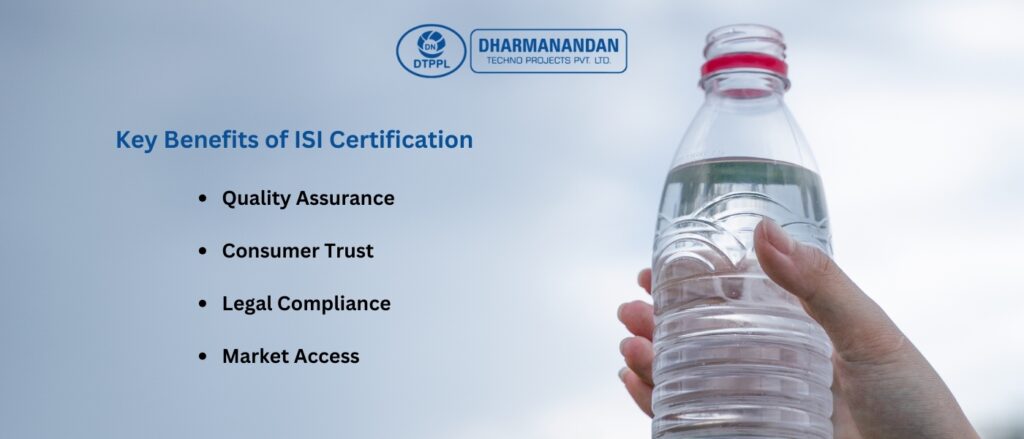
Steps to Obtain an ISI Certification for Mineral Water Plants
Step 1: Application Process
The first step is to apply for the ISI license by submitting a formal application to the BIS. This application will require details about your business, the plant, and the product you are looking to certify.
Step 2: Product Testing and Laboratory Setup
Before certification is granted, the water you produce must undergo rigorous testing. BIS mandates that you either set up an in-house laboratory or partner with an external lab to ensure your water meets the quality standards.
Step 3: Documentation and Factory Inspection
Once your product passes the tests, BIS will inspect your production facility to ensure that all operational procedures align with their quality guidelines. You must also provide comprehensive documentation that includes the water’s chemical properties and quality checks.
Essential Documentation for ISI Certification
- Application form with business details
- Water quality reports from approved labs
- Proof of plant location and layout
- Details of machinery and equipment
- Staff qualifications and roles
Costs and Timeframe for Obtaining ISI Certification
The costs for obtaining ISI certification can vary depending on the size of your business and the number of tests required. On average, you can expect to pay between INR 50,000 to INR 1,00,000 for obtaining ISI Certification. The process typically takes 3 to 6 months.
Understanding the FSSAI License
The FSSAI license is required for all food-related businesses in India, including mineral water plants. It ensures that the water produced meets hygiene and safety standards as laid out by the Food Safety and Standards Act of 2006.
Key Benefits of FSSAI Certification
- Food Safety Compliance: An FSSAI license ensures that the water you are producing is safe for consumption.
- Consumer Confidence: Just like ISI, the FSSAI mark is recognized by consumers as a sign of trust.
- Legal Protection: With the FSSAI license, your business is protected from legal issues related to food safety.
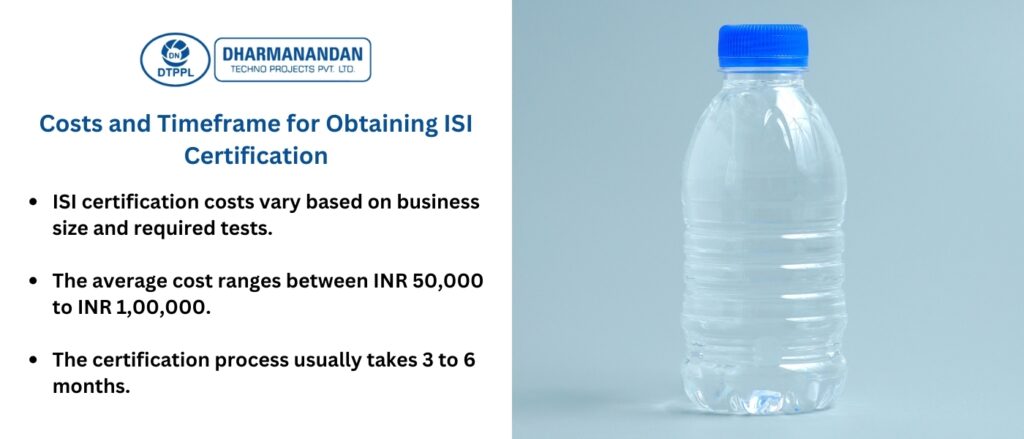
Steps to Obtain an FSSAI License for Mineral Water Plants
Step 1: Registration
Begin by registering your mineral water plant on the FSSAI website. Depending on the size of your business, you may apply for either a state or central license.
Step 2: Submitting the Necessary Documents
You will need to submit several documents including business details, proof of address, and a water quality report. It’s essential that these documents are accurate and up to date.
Step 3: Inspection and Final Approval
After submission, FSSAI officials will inspect your facility. If the plant meets safety standards, the license will be granted.
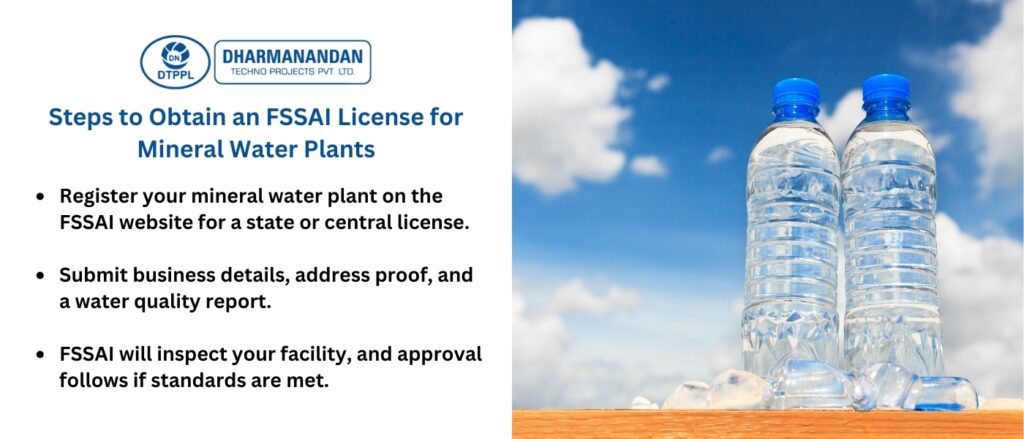
Essential Documentation for FSSAI Licensing
- Business registration proof
- Water quality report
- Plan of the plant and its infrastructure
- Employee health and safety records
Costs and Timeframe for Obtaining an FSSAI License
The cost of the FSSAI license depends on the type of license you are applying for (state or central). Generally, FSSAI license costs can range from INR 2,000 to INR 7,500. The approval process usually takes between 1 to 2 months.
Comparison Between ISI (BIS) and FSSAI Certifications
While both certifications are essential for a mineral water plant, they cover different aspects. ISI certification is focused on the quality of the water itself, whereas FSSAI ensures that the entire production process meets hygiene and safety standards. Having both certifications will safeguard your business from regulatory issues and ensure consumer trust.
Common Mistakes to Avoid When Applying for ISI or FSSAI Certification
- Incomplete documentation is a common reason for application delays.
- Ensure that your production facility meets all the necessary safety and quality standards before applying.
- Neglecting to renew these certifications on time can result in fines or operational shutdowns.
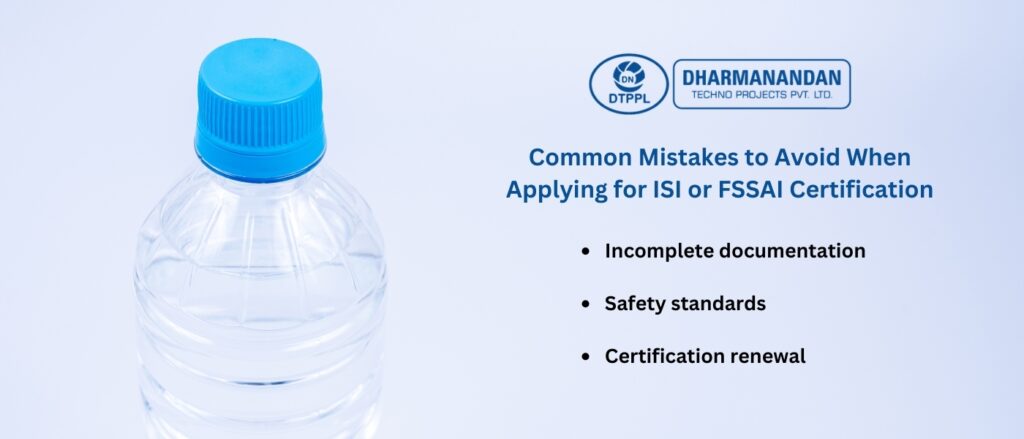
Conclusion
Obtaining both the ISI and FSSAI certifications is a crucial step in establishing a successful and legally compliant mineral water plant in India. These certifications not only ensure that your product is safe for consumers but also open doors for market expansion and customer trust. By following the outlined steps and ensuring all documentation is in order, you can navigate the process smoothly and set your business up for long-term success.
About Author

Director – Global Marketing and Sales
Mr. Bhavesh from Dharmanandan Techno Projects Pvt. Ltd. has played a pivotal role in elevating the DTPPL brand to the global stage, leveraging his exceptional expertise in marketing and communications. He is committed to helping clients achieve significant growth while strengthening their own brands. Dharmanandan Techno Projects Pvt. Ltd. is a leading manufacturer and supplier of water purification systems and turnkey solutions for mineral water plants. With years of experience in designing and delivering high-quality water treatment solutions, the company provides end-to-end services, including system design, installation, maintenance, and ongoing support. Specializing in scalable and customizable water plants, DTPPL has successfully served industries worldwide, ensuring clean and safe drinking water across diverse applications.




